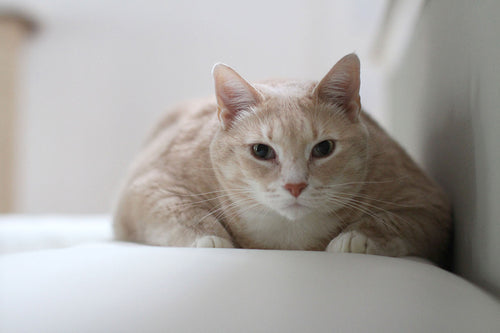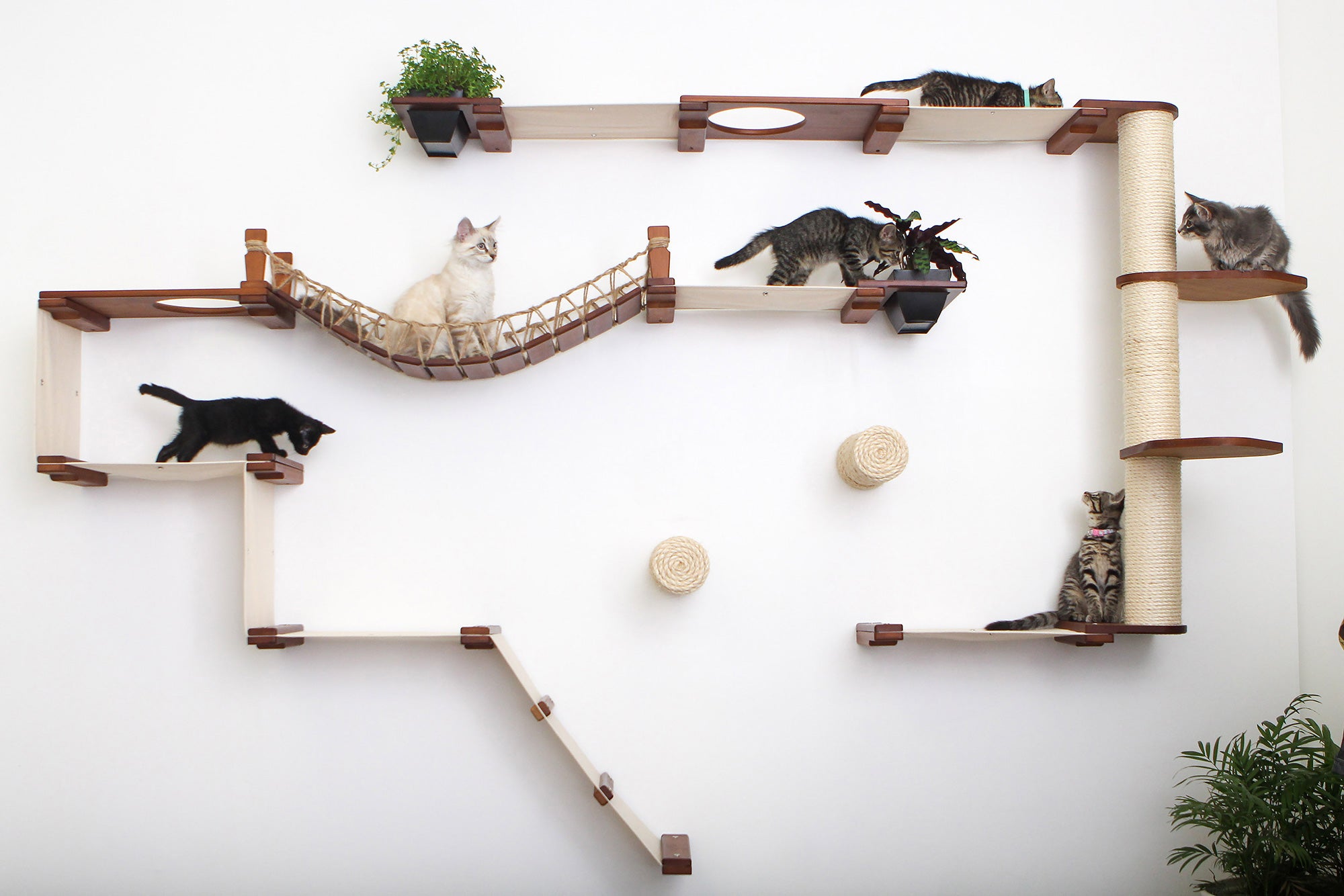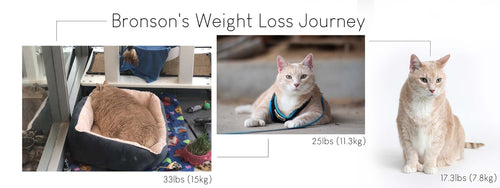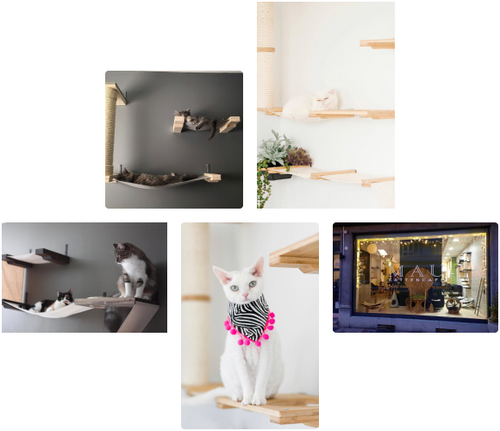Cats experience anxiety for the same reasons that humans do; they anticipate danger or feel fear. Although it may seem that your cat is anxious or afraid for no reason, it may just be that you do not know or understand what is making them uncomfortable in their environment.
There are plenty of reasons why your cat may be hiding around the house or skittish when others are around. These include problems such as new stressors in his/her environment, pain, sickness, a past traumatic event, dementia, a lack of socialization, abandonment issues, etc.
Signs to watch for to see if your cat is stressed or anxious:
- Trying to escape
- Aggressive behavior
- Urinating outside of the litter box
- Over-grooming
- Hiding
- Becoming less active
- Loss of appetite
- Extreme vocalization
- Excessive sucking on fabric

If you notice these signs in your own cat, the first thing you want to do is make your cat feel safe and relaxed. With an anxious cat the smartest move is to take him/her to the Vet. This way you can find out if the anxiety is coming from something physical, like pain, or psychological, such as past neglect. Treatments can include anti-anxiety medication and/or working with an animal behaviorist. By discovering what gives your cat anxiety, you can either remove it from their environment or work on creating positive association to it.

TIPS FOR CREATING A LESS STRESSFUL ENVIRONMENT FOR YOUR CAT
1. Take care of their litter box! Size, litter, location, and cleanliness of it all matter.
There should be one litter box per cat in the house, and then one extra. The location of the litter box can effect whether or not the cat will use it. Keep the litter box somewhere that is private but easily accessible, and away from any noisy appliances. When it comes to picking out what type of litter to use, it is all about what your cat likes.
Typically cats will like smaller grain litter better, but do whatever works for yours! Once you find one they enjoy and use stick with it. Changing the type of litter too much can be confusing for cats and makes it seem unfamiliar. Finally, scoop your cat's litter box out daily. Changing the litter out completely depends on the type of litter you get, but generally every two weeks will be good. Scrub the litter box clean every time you change the litter.

2. Create high spaces where your cat can jump and play
Cats are extremely playful. Their natural instincts are things like hunting, jumping, scratching, etc. While it is much safer to have indoor cats, being inside all of the time and unable to perform these things can become frustrating for a cat and decreases their overall well-being. Areas that they can climb and play on are important to satisfy those needs.
3. Give your cat healthy and nutritious food - ask for recommendations from friends, family, and most importantly, your Vet.
Talking with your Vet and doing your research about what kind of food to give your cat is so important. There are things you may not know such as how cats typically get most of their water from food! Which means that too much dry food can lead to a higher level of dehydration in cats. We feed ourselves food that keeps us healthy and energized, there should be no difference in what we feed our cats.

4. Always have fresh water available.

As stated above, cats naturally would get most of their water from the food they eat. This means that if you're feeding your cat mainly dry food, then they should have fresh water available to them at all times. Cats prefer to search and find their water and food meaning that their water and food bowls should not be right next to each other. If they are, the cat is less likely to drink as much water.
5. Have multiple scratching posts. Cats like to claim their territory and this helps them do so, and it saves your furniture.
If you have or ever have had a cat you are fully aware that they are picky. One scratching post may mean nothing to them while another is their world - or maybe it just depends on the day. Either way, cats should have multiple areas to go crazy scratching. It allows them to mark their space so if you have more than one cat in your home they should each have their own scratching areas. These can be scratching posts, vertical or horizontal boards, cardboard scratching areas, etc. The possibilities are nearly endless so find some that your cat loves and let them go crazy.
6. Food puzzles allow cats to feel like they’re hunting for their food, making it more fun and natural for them
Not only is the quality of a cats food important, but the way they receive their food is as well. Food puzzles are made so that cats can satisfy their natural hunting instincts. These are toys that can be around the house that cats have to figure out how to use in order to get their food or treats. There is an abundance of these food puzzles that cat owners can buy, but it is also super easy to make your own!
7. Give them some space! Your cat should have multiple areas around the house where he/she can go to relax.
Cats are extremely independent. They enjoy having spaces around the house that are either high up or small and hidden. This comes from their hunting instincts. These types of places feel safe to them. They should have plenty of these spots around the home to go to in order for them to feel relaxed.
8. Do not underestimate the importance of play or affection
Play and affection are both important when it comes to taking care of your cat, not only do these create a better bond between you and your cat, but they reduce stress levels in the cat as well. Play allows your cat to be active keeping him/her healthy and in shape.
Cats are known to be far less affectionate than dogs, but the truth is, it is not that cats are never affectionate, it's that they simply have to trust and be very comfortable with people before they will be. This takes time and patience. By creating a safe and comfortable environment for your cat, and giving him/her the space that they need, they will trust you and want to be around you more often.

Further Research
Cat Anxiety: Understanding Your Stressed Cat
10 Tips for Creating a Stress-Free Environment for Your Cat
How to Train Your Cat to Be Less Anxious








